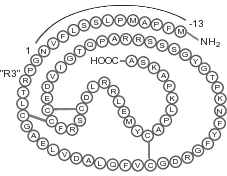



Categories: IGF-1 Proteins
GF-1 LR31mg (Receptor Grade)
Receptor Grade IGF-1 LR3 is a premium research reagent for use in cell growth studies,IGF receptors and lGF binding proteins and is more potent than rH lGF-1 and MediaGrade lGF-1 LR3 in-vitro due to the drastic increase in biological activity (stronger affinityfor the lGF receptor). This increased biological activity is what sets Receptor Grade IGF-1LR3 apart from Media Grade (standard) IGF-1 LR3. Media grade lGF-1 LR3 is morecommonly used in commercial cell culture vs mammalian and can also be used as aresearch reagent at an economical cost to enable studies where biological potency is ofless value. To maximize results in an animal-based in-vitro cell study or production,Receptor Grade IGF-1 LR3 should be used exclusively. The supplementation ofmammalian cell cultures with Long R3 lGF-1 at a much lower concentration results inmore highly elevated productivity than with standard concentrations of insulin and/orstandard lGF-1. lGF-1 LR3 is better able to stimulate the type 1 lGF receptor and thusinduce a higher level of intracellular signaling, cell proliferation and inhibition of apoptosis.
Receptor Grade lGF-1 LR3 is more biologically active than standard lGF-1 LR3, in-vitro. Resultantly, Receptor Grade lGF-1 LR3 will deliver superior results incomparison to standard lGE.1 LR3.
IGF-1 LR3, Recepto Grade

Sequence: MFPAMP LSSLF VNGPR TLCGA ELVDALOFVC GDRGF YFNKP TGYGS SSRRA POTGIVDECCFR SCDLRR LEMY CAPLK PAKSAMolar Mass: 9.111 Da
Synonyms:Long Arg3 lGF-1(Receptor Grade)
Long R3 IGF-1, Receptor Grade
IGFB Binding andThe increasedBiological Activityof Long R3 IGF-1
By resisting lGFBP-binding, IGF-1 LR3 has a greater effect than lGF-1. The longerduration of action allows for smaller amounts to be used with the same effects. SomeIGF-1 derivatives, such as the GPE derivative, made up of just the last three N-terminalamino acids of the lGF-1 protein, have been shown to have therapeutic effects inneurological injuries like stroke. Most studies concerning the effects of IGF-1 derivativeshave been carried out in non-human animal models or cell culture studies.
Insulin Like GrowthFactor Receptornteractions
IGF-1 binds to at least two cell surface receptors: lGF-1R and the insulin receptor. TheIGF-1 receptor is referred to as the “physiologic” receptor because lGF-1 binds to it withsignificantly higher affinity (approximately 100 times higher) than it does to the insulinreceptor. By binding to IGF-1R, IGF-1 can affect metabolism, cell growth (hypertrophy),differentiation and cell division (hyperplasia), prevention of cell death (apoptosis), normaldevelopment, and even malignant growth. lGF-1R has been implicated in severaldifferent types of cancer include breast, prostate, and lung cancer. lGF-1 also binds to theinsulin receptor and activates it, thereby encouraging cells to take up glucose from theblood stream. The effects of lGF-1 on muscle cells are three-fold. Firstly, IGF-1encourages hyperplasia, or an increase in the number of muscle cells. Secondly, IGF-1has a strong effect on skeletal muscle – In regards to the life span of satellite cells.Satellite cells support muscle cells, providing them with needed nutrients and helpingthem to operate efficiently. By increasing the lifespan of these cells, lGF-1 helps toincrease their number with muscle tissue. Finally, IGF-1 encourages differentiation ofmyoblasts, which is to say that it encourages the conversion of stem cell progeny fromnonspecific pluripotent stem cells into dedicated muscle tissue. In this way, IGF-1increases the rate of muscle development by increasing the rate at which generic stemcells are converted to muscle cells.
ALL ARTICLES AND PRODUCT INFORMATION PROVIDED ON THIS WEBSITE AREFOR INFORMATIONAL AND EDUCATIONAL PURPOSES ONLY.
The products offered on this website are furnished for in-vitro studies only. In-vitro studies(Latin: in glass) are performed outside of the body. These products are not medicines ordrugs and have not been approved by the FDA to prevent, treat or cure any medicalcondition, ailment or disease. Bodily introduction of any kind into humans or animals isstrictly forbidden by law.
PeptideGurus is a leading supplier of American-made research peptides, offering top-quality products at competitive prices. With a focus on excellence and customer service, they ensure a secure and convenient ordering process with global shipping.
CONTACT